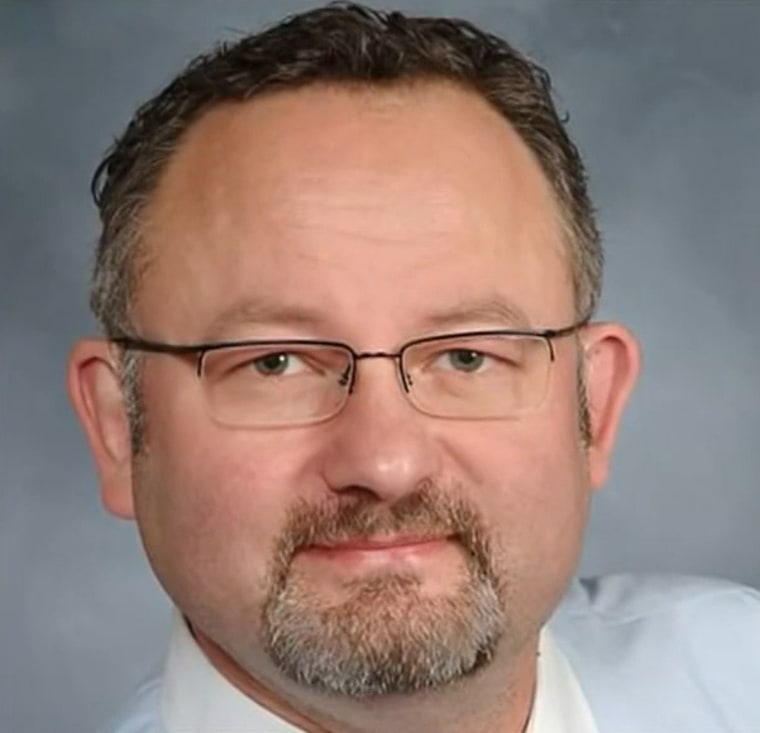Between 2006 and 2018, at least five complaints were made by patients and employees of Weill Cornell, accusing Paduch of a range of inappropriate behavior and sexually charged remarks, according to interviews with patients and lawyers as well as a review of hundreds of pages of court documents.
“This is not a man who was able to abuse hundreds, if not thousands, of patients in a vacuum,” said Mallory Allen, a Seattle-based attorney who represents 140 men, including BR.
She called Paduch “sadistic” and a “sexual predator” who leveraged being a doctor to victimize his patients. “He did so under the banner of the institutions where he worked,” Allen added.
Paduch, 57, was sentenced Wednesday to life in prison for sexually abusing the seven former patients between 2007 and 2022.

Spokespeople for Weill Cornell and Northwell Health declined to answer specific questions related to Paduch, citing the ongoing litigation.
“Darius Paduch betrayed the sacred trust of a caregiver, caused profound harm to his patients, and lied to the Northwell Health community,” a spokesperson said in a statement. “Providing the best care to our patients comes first at Northwell which is why we were appalled by the deeply disturbing revelations that came out during Dr. Paduch’s criminal trial.”
A spokesperson for Weill Cornell Medicine said the hospital has enhanced its policies “to minimize the risk of such abhorrent conduct occurring in the future.”
“We launched expanded chaperone policies and training in September 2023, which also included new requirements for clinical practices, such as prominent signage in exam rooms and additional documentation procedures,” the statement said.
Azza AbuDagga, a health services researcher for the consumer rights advocacy group Public Citizen, said it’s not uncommon for abusive doctors to avoid repercussions in part because of who is responsible for deciding whether to take action.
“Who regulates doctors? Doctors,” said AbuDagga, speaking generally based on research she conducted for two reports on the sexual abuse of patients by physicians in 2016 and 2020. “I call it a conspiracy of silence.”
She said hospital executives also have a strong incentive to keep such allegations quiet to avoid negative publicity and the prospect of losing a profitable doctor.
“There should be zero tolerance for this kind of problem,” she said. “You will rarely find a hospital that adopts that standard.”
‘Completely dismissed’
Paduch was a leading figure in the field of urology. A graduate of the Medical Academy of Lodz in Poland, he specialized in male infertility, publishing dozens of medical articles and attracting patients from all over the country.
But behind closed doors, Paduch preyed on the men and boys who sought him out.
Manhattan lawyer Thomas Giuffra said that in 2006, one of his clients complained to two doctors at Weill Cornell — one male and one female — that Paduch masturbated him.
“They both told him he misinterpreted it, that he imagined it,” said Giuffra, who has filed a lawsuit on behalf of the man. “He was completely dismissed.”
Urologist patients are uniquely vulnerable to abuse, experts say, because of the intimate nature of the medical care and the lack of general knowledge about what falls outside the boundaries of standard procedure. Two urologists testified at Paduch’s trial that it’s never appropriate to manually stimulate a patient.
One of the men who filed a lawsuit against Paduch had medical training himself but said he still didn’t realize until many years later that it was abuse. The man, a neuroscientist who had a fertility issue, said Paduch forced him to masturbate in front of him and grabbed his penis to show him the “correct” technique.
“If this can happen to me, it can happen to anybody,” the man said.
In an interview, BR said he first reported Paduch’s conduct to another Weill Cornell urologist in 2011, but he doesn’t believe it was taken seriously because nobody followed up with him.
It was seven years later, after Harvey Weinstein was arrested and the #MeToo movement was taking off, that he went online and saw other patients had complained about Paduch. BR decided to file an official complaint with the New York Health Department’s Office of Professional Medical Conduct.
“During a series of office consultations,” BR wrote, Paduch “engaged in a number of abusive and inappropriate actions, including “requiring that I masturbate in front of him so he could examine my erect penis” and “photographing my erect penis.”

BR also emailed a copy of the report to NewYork-Presbyterian Hospital’s associate general counsel in March 2018, according to a copy of the email viewed by NBC News.
But he said he didn’t hear back from the state Health Department or the hospital for months. Paduch, meanwhile, continued to see patients.
‘Shocking and embarrassing’
By then, Weill Cornell had already received at least two complaints about Paduch from its own employees, going back more than a decade.
In December 2007, a clinical technician said in an internal email that Paduch’s use of humor with some patients was “very inappropriate, shocking, and embarrassing” and that Paduch’s use of language with patients was “very sexual and at times demeaning,” according to court filings.
Then in 2012, another employee — a male nurse who worked with Paduch — wrote a letter to human resources laying out several examples of what he described as Paduch’s inappropriate behavior, according to court filings.
Paduch once said that a patient was so hot that he wanted him to “drop to [his] knees.” Then he made a gesture indicating oral sex, according to the letter. It also stated that Paduch had previously gotten into trouble with HR for telling a patient that it looked like he “has cum in [his] hair.”
About nine months after BR contacted the state Health Department and Weill Cornell, a hospital employee acknowledged in an internal email that Paduch had been the subject of unspecified complaints over “events” stretching back a decade.
“Several events have occurred over the past 10 years and were handled at the departmental level with faculty counseling,” read the email, which was sent to a hospital administrator in December 2018 and has since been filed in court.
The employee sought the administrator’s participation “in evaluation of a faculty member” — identified as Paduch — “who has had several patient comments or complaints regarding his interaction with patients.”
The details of the complaints were not provided, and Weill Cornell did not respond to a request for additional information.
BR said he was interviewed by someone in human resources at Weill Cornell around December 2018, the same time the internal email was sent, but there was no follow-up.
He said he heard from an investigator with the state Health Department’s Office of Professional Medical Conduct a few months earlier. The investigator said in the call that he probably couldn’t pursue the case because there was no unequivocally sexual behavior, according to BR.

Leave a Reply